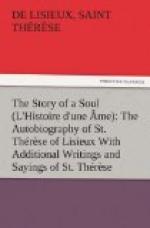* * * * * *
“Do you know which are my Sundays and feast-days? They are the days on which God tries me the most.”
* * * * * *
I was distressed at my want of courage, and Soeur Therese said to me: “You are complaining of what should be your greatest happiness. If you fought only when you felt eagerness, where would be your merit? What does it matter, even if you are devoid of courage, provided you act as though you possessed it? If you feel too lazy to pick up a bit of thread, and yet do so for love of Jesus, you acquire more merit than for a much nobler action done in a moment of fervour. Instead of grieving, be glad that, by allowing you to feel your own weakness, Our Lord is furnishing you with an opportunity of saving a greater number of souls.”
* * * * * *
I asked her whether Our Lord were not displeased at the sight of my many failings. This was her answer: “Be comforted, for He Whom you have chosen as your Spouse has every imaginable perfection; but—dare I say it?—He has one great infirmity too—He is blind! And there is a science about which He knows nothing—addition! These two great defects, much to be deplored in an earthly bridegroom, do but make ours infinitely more lovable. Were it necessary that He should be clear-sighted, and familiar with the science of figures, do you not think that, confronted with our many sins, He would send us back to our nothingness? But His Love for us makes him actually blind.
“If the greatest sinner on earth should repent at the moment of his death, and draw His last breath in an act of love, neither the many graces he had abused, nor the multiplied crimes he had committed, would stand in his way. Our Lord would see nothing, count nothing, but the sinner’s last prayer, and without delay He would receive him into the arms of His Mercy.
“But, to make Him thus blind and to prevent Him doing the smallest sum of addition, we must approach Him through His Heart—on that side He is vulnerable and defenceless.”
* * * * * *
I had grieved her, and had gone to ask her pardon: “If you but knew what I feel!” she exclaimed. “Never have I more clearly understood the love with which Jesus receives us when we seek His forgiveness. If I, His poor little creature, feel so tenderly towards you when you come back to me, what must pass through Our Lord’s Divine Heart when we return to Him? Far more quickly than I have just done will He blot out our sins from His memory. . . . Nay, He will even love us more tenderly than before we fell.”
* * * * * *
I had an immense dread of the judgments of God, and no argument of Soeur Therese could remove it. One day I put to her the following objection: “It is often said to us that in God’s sight the angels themselves are not pure. How, therefore, can you expect me to be otherwise than filled with fear?”




